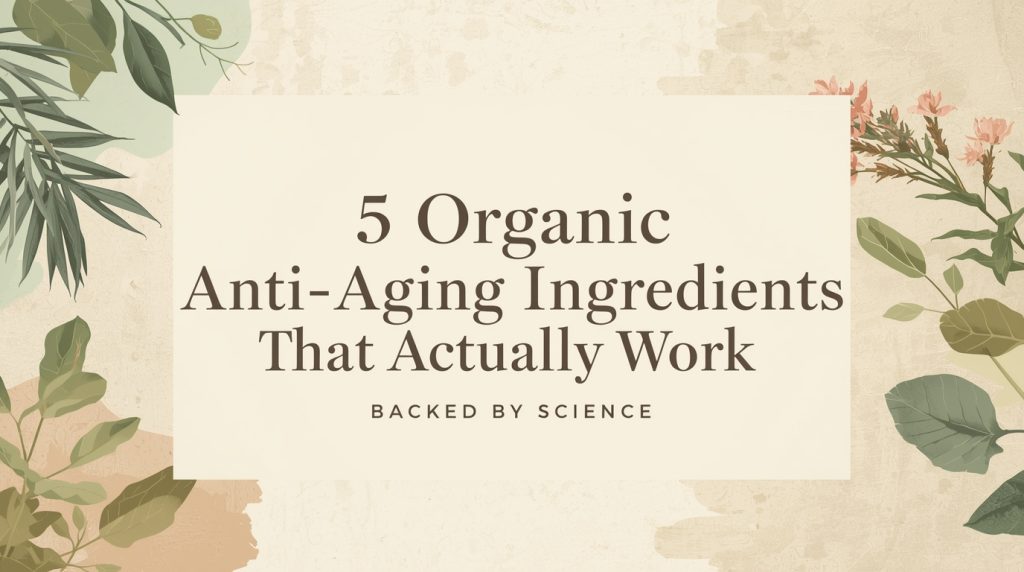If you want real anti-aging results without the irritation or ethical compromises of harsher actives, plant-forward formulations can deliver. Below are five organic anti-aging ingredients that the science supports, how they work at the cellular level, which skin concerns they help, how they compare to synthetic alternatives, and how Herbaluxe incorporates them into massage-first, slow-beauty treatments. Use this as a practical guide to choosing natural skincare ingredients that actually move the needle — and to understand why plant-based retinol alternatives are no longer just a niche trend.
1) Bakuchiol — the leading plant-based retinol alternative
What it is & how it works:
Bakuchiol is a botanical extract (from the seeds and leaves of Psoralea corylifolia) that mimics many of retinol’s benefits without the typical irritation. At a cellular level, bakuchiol modulates gene expression involved in collagen synthesis and epidermal turnover, helping to smooth fine lines and improve skin texture.
Compared to retinol:
Unlike prescription retinoids or high-strength retinol, bakuchiol is generally non-irritating and safe for more skin types, including sensitive skin and those who cannot tolerate retinoids during pregnancy or breastfeeding (always check with your provider). While bakuchiol’s effects may appear more gradually, clinical studies have shown comparable improvements in fine lines and hyperpigmentation over weeks to months.
Best for:
Fine lines, uneven texture, early signs of aging, and anyone seeking a gentler option to retinol.
How Herbaluxe uses it:
We pair bakuchiol serums with gentle facial massage and gua sha to boost absorption while minimizing irritation — ideal for clients adopting a slow-beauty, long-game approach to collagen support.
2) Rosehip Oil — essential fatty acids + natural retinoid precursors
What it is & how it works:
Cold-pressed rosehip oil is rich in linoleic and linolenic acids (omega-6 and omega-3), vitamin A precursors, and carotenoids. These components support barrier repair, reduce transepidermal water loss, and promote a more even tone. Rosehip contains provitamin A compounds that gently encourage cellular turnover without the harshness of direct retinoids.
Compared to synthetic retinoids:
Rosehip oil won’t produce the same dramatic cellular turnover speed as prescription retinoids, but it offers a low-irritation path to improved texture and pigmentation when used consistently. Its essential fatty acids also uniquely support barrier function — something retinoids can compromise if overused.
Best for:
Dry, sensitive, or mature skin that needs nourishment, barrier repair, and gentle tone correction.
How Herbaluxe uses it:
We use organic rosehip as a finishing oil after massage and in restorative masks—its emollient and reparative properties lock in moisture and soothe post-treatment skin.
3) Vitamin C — collagen-boosting antioxidant (choose the right form)
What it is & how it works:
Vitamin C (ascorbic acid and its stable derivatives) is a potent antioxidant that stimulates collagen synthesis, stabilizes collagen fibers, and neutralizes free radicals that accelerate aging. At the cellular level it acts as a cofactor for prolyl and lysyl hydroxylase—enzymes essential to building and maintaining collagen.
Formulations matter:
L-ascorbic acid is the gold standard for efficacy but can be unstable and sometimes irritating. Stable, lipophilic derivatives (like ascorbyl tetraisopalmitate) and buffered forms offer gentler, longer-lasting vitamin C delivery in organic formulations.
Compared to synthetic antioxidants:
Synthetic antioxidants can be effective, but many botanical sources (rosehips, kakadu plum, amla) provide vitamin C alongside complementary phytochemicals and anti-inflammatory compounds, which may reduce irritation and support overall skin health.
Best for:
Dullness, photoaging, uneven tone, and anyone looking to proactively protect collagen.
How Herbaluxe uses it:
We incorporate stable vitamin C serums pre-massage to protect tissues during treatment and follow with hydrating actives—this combination increases radiance immediately while supporting long-term collagen integrity.
4) Hyaluronic Acid — bioidentical hydration and plumping
What it is & how it works:
Hyaluronic acid (HA) is a naturally occurring polysaccharide that holds many times its weight in water. In topical products, HA helps retain moisture in the epidermis and dermis, improving plumpness and reducing the visual depth of fine lines.
Why “organic” HA matters less than formulation:
HA itself is bioidentical whether produced by microbial fermentation or derived otherwise—what matters is molecular weight and formulation. Low-molecular-weight HA penetrates more deeply; high-molecular-weight HA forms a moisture-locking film on the skin. Thoughtful formulations often combine multiple molecular weights for short- and long-term hydration.
Compared to synthetics:
HA is often considered a “natural” molecule even in lab-made formats; the advantage in organic skincare lies in complementary botanicals that support barrier function and reduce irritation.
Best for:
Dehydrated skin, loss of plumpness, and anyone seeking immediate smoothing effects with no downtime.
How Herbaluxe uses it:
Hyaluronic serums are a staple before massage—combined with lymphatic techniques, HA helps create a hydrated canvas that enhances tissue glide and comfort while improving immediate visual plumping.
5) Pomegranate (ellagic acid & polyphenols) — antioxidant & collagen protection
What it is & how it works:
Pomegranate is rich in polyphenols and ellagitannins (including ellagic acid), powerful antioxidants that help protect collagen from oxidative breakdown. Some research points to pomegranate metabolites supporting mitochondrial health and cellular resilience, which may translate to preserved collagen function and reduced photoaging.
Compared to synthetic antioxidants:
Botanical antioxidants like pomegranate bring a complex mixture of compounds that act synergistically; this multi-targeted approach can be more effective at reducing oxidative stress in the long run than single-molecule antioxidants.
Best for:
Sun-exposed skin, pigmentation concerns, and anyone looking to protect long-term collagen integrity.
How Herbaluxe uses it:
Pomegranate extracts feature in masks and antioxidant serums we apply after drainage and massage to calm tissues, neutralize free radicals, and reinforce cellular repair processes.
Putting it together: routine tips and safety notes
- Layer smartly: apply lightweight, water-based serums (vitamin C, HA) first, then bakuchiol or rosehip oil as the nourishing layer. Massage enhances absorption and efficacy.
- Start slow with actives: introduce bakuchiol and vitamin C gradually and monitor skin response—slow beauty values patience and listening.
- Sun protection is non-negotiable: antioxidants and active ingredients need daily broad-spectrum SPF to preserve results and prevent further photoaging.
- Pair with massage: Herbaluxe’s massage-first approach isn’t just luxurious—it improves circulation, lymphatic drainage, and product penetration, making natural actives work harder and kinder.
- Be evidence-driven: choose products that disclose active concentrations and stability data when possible. Organic certification is valuable, but ingredient transparency is paramount.
Final thoughts
The best organic anti-aging ingredients are those that work with skin biology rather than against it. Bakuchiol, rosehip oil, vitamin C, hyaluronic acid, and pomegranate each bring scientifically plausible, clinically observed benefits that address aging from multiple angles: collagen support, hydration, barrier repair, antioxidant protection, and gentle cellular turnover. When combined with Herbaluxe’s massage-centered treatments, these natural skincare ingredients become a powerful, low-irritation system for aging gracefully.

